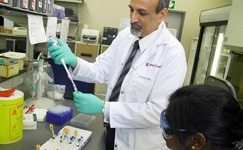SA scientist to head new UNAids panel
5 June 2013
South African epidemiologist Salim Abdool Karim has been appointed chair of the
newly established UNAids Scientific Expert Panel, which will advise on scientific
discoveries and strategic needs in Aids research.
Karim has conducted research on HIV epidemiology, pathogenesis, prevention and
treatment over the past 25 years and holds academic appointments at the University
of KwaZulu-Natal in Durban and at Columbia University in New York.
He is also director of the Centre for the Aids Programme of Research in South Africa,
as well as the interim president of the South African Medical Research Council.
"In the 30 years since HIV was identified, the progress made by science has been
extraordinary and its benefits have been felt far beyond those directly affected by
HIV," UNAids executive director Michel Sidibe said at a UNAids Scientific Symposium
in Durban on Monday.
"To reach the end of the Aids epidemic, we
need to continue to embrace science
and innovation and I am delighted that Professor Karim has agreed to take on the
leadership of our new UNAids scientific panel."
The panel's functions will include convening international scientific consultations to
facilitate knowledge sharing and advising UNAids on how it can adjust its policies to
best shape global Aids response.
The symposium hosted in Durban was the first of these consultations and was held
under the theme "Scientific advances from the 'Mississippi baby': Implications for
public health programmes on mother to child transmission of HIV".
Experts discussed ways to improve early diagnosis of HIV in new-born children and
implications of starting them on antiretroviral therapy early, and the insight gained
will be passed on from the panel to UNAids to aid future solutions.
"Science has the power to illuminate the future path to defeating Aids," Karim said. "I
am humbled by this
appointment and look forward to this new challenge."
Part of the challenge will also involve analysing the relevance of new research and
findings and how these can be rapidly implemented to prevent new infections and
improve the lives of people living with HIV.
SAinfo reporter
 Professor Salim Abdool Karim, director of the Centre for the Aids Programme of Research in South Africa (Caprisa), at work in one of the centre's laboratories (Photo: Caprisa)
Professor Salim Abdool Karim, director of the Centre for the Aids Programme of Research in South Africa (Caprisa), at work in one of the centre's laboratories (Photo: Caprisa)



